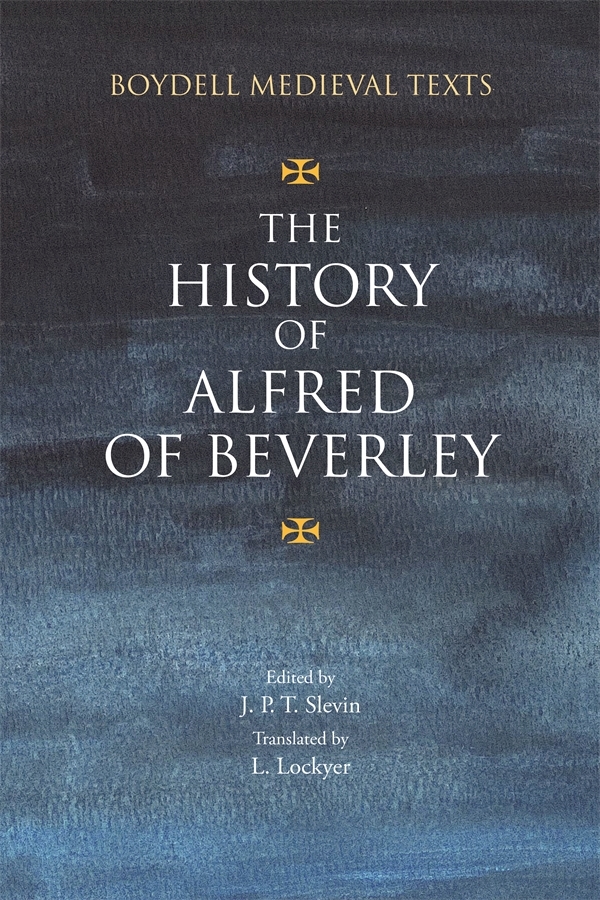
Posted by Helen Birkett
2 August 2023We are very happy to announce the publication of an edition and translation of The History of Alfred of Beverley by one of our former PhD students, Dr John Slevin, in collaboration with Lynda Lockyer.
Alfred of Beverley was the subject of both John’s Master’s dissertation at Birkbeck and his doctoral thesis at Exeter, which he completed under the supervision of Julia Crick (now Professor of Palaeography and Manuscript Studies at KCL) in 2013. A little-known writer, Alfred was a secular canon of Beverley Minster, who wrote a history of Britain at some point between c.1148 and c.1151. His History covers the period from the alleged foundation of Britain by Brutus to the death of Henry I in 1135 (not 1129, as previously thought). Around 90% of the text is taken from the works of others and it includes very little personal commentary from the author – which means that, prior to John’s study, Alfred’s History had been dismissed as derivative and of little interest to historians of the twelfth century. However, while the insights it gives into Alfred’s own times are limited, Alfred’s text has much to tell us about the writing of history and the dissemination of historical works in England in this period.
Alfred makes use of four of the most important histories written in England in the twelfth century: Geoffrey of Monmouth’s History of the Kings of Britain; Henry of Huntingdon’s History of the English; John of Worcester’s chronicle; and the History of the Kings of the English and the Danes attributed to Symeon of Durham. Symeon’s text only survives in one manuscript, which dates to the 1180s. But as Alfred was writing thirty years before this, he had access to an earlier copy, which makes Alfred’s History an important witness to the development of Symeon’s text – and, indeed, John’s work will be cited in the new edition being prepared by David Rollason for the Oxford Medieval Text series. Likewise, Alfred’s History also offers insights into the early sections of John of Worcester’s chronicle, an edition of which is also currently under preparation.
Alfred’s History demonstrates that collaboration and the sharing of information occurred across various different centres in England – not just the major Benedictine abbeys which have been the focus of much recent scholarship. Although John suspects that Alfred carried out most of his writing activities in Beverley, he may also have travelled to other libraries or had works sent to him from the episcopal libraries at York or Lincoln. Indeed, the historian who had the most influence on Alfred’s work was his direct contemporary, Henry of Huntingdon, an archdeacon and member of the chapter at Lincoln Cathedral. The cities and churches of Lincoln and Beverley were closely connected in this period, and, as secular churchmen, Henry and Alfred seem to have shared a similar perspective on contemporary England and its past.
And while much of Alfred’s work is taken from other texts, John argues that Alfred used this material with much greater nuance than has previously been assumed. Alfred edited and abbreviated his sources, he left information out, and he took text out of one context and placed it in another to create a different story. For example, he imposed a new periodization on Geoffrey of Monmouth’s work, which broke it up into different sections with different themes. It’s also clear that, through his attempts to reconcile Geoffrey’s narrative with other historical works, Alfred became sceptical of Geoffrey’s text – he was not simply a copyist, but a critical compiler.
Although the audience of Alfred’s work does not seem to have been wide, it did have some impact on medieval historical writing. A copy of the History was present at Furness Abbey in the late thirteenth century, where it provided the basis for the abbey’s chronicle. Another copy was available to Ranulf Higden in Chester in the late fourteenth century, who drew on Alfred’s periodization for his own work, the Polychronicon. And we have an extant fifteenth-century manuscript copy, commissioned by Henry de Newton, the Treasurer of York Minster (1393-1414). There is also the suggestion that Alfred’s work was known to the late twelfth-century historian, and fellow critic of Geoffrey of Monmouth, William of Newburgh, who refers to a history that ends in 1135 – and is something that John is currently investigating.
Alfred’s work might not change our view of what happened in the twelfth century, but John’s text and analysis make a significant contribution to the booming field of English historiographical writing. As John explains, the edition of Alfred’s History ‘rescues an important piece of historical writing from this period from almost total oblivion’ – and shows the value in studying what have previously been dismissed as simply ‘derivative’ texts.